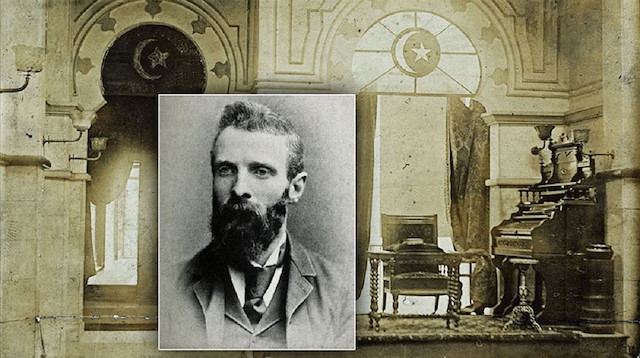
Born in a Christian family, Quilliam converted to Islam and founded England’s first mosque and Islamic center
An Anglo-Muslim genius, who shot into prominence in Britain in the 19th century to the extent that 600 people converted to Islam due to his influence lies buried in an unmarked grave in Brookwood Cemetery in London.
Recognizing his contribution, the 26th Ottoman Caliph, Abdul Hamid II had granted Abdulla Quilliam, who had converted from Christianity to Islam the title of Sheikh-ul-Islam of Britain. He turned out to be the first and last Sheikh-ul-Islam of the West.
On his 164th birth anniversary on Friday, Quilliam is remembered as the founder of England’s first mosque and Islamic center.
Born in a wealthy Christian family in Liverpool as William Henry Quilliam on April 10, 1856, many Britishers dubbed him a traitor, for his argument that Muslims should not fight Muslims on behalf of European powers and his denouncement of British foreign policy in Sudan.
Before converting to Islam in 1887 after visiting France, Algeria, Morocco, and Gibraltar, to recover from an illness, he had become a well-known solicitor. He had also led a social movement against the consumption of alcohol.
Quilliam’s parents were Wesleyan Methodists and his maternal grandfather was a preacher. He was a regular attendee at the Fairfield Wesleyan Chapel and taught at a Sunday School at the United Methodist Free Church.
-Author, solicitor and journalist
While working as a solicitor, he also wrote for various newspapers, including the Liverpool Mercury, the Albion, the London Globe, and the Lantern. Author of The Faith in Islam, a book published in 1889, Quilliam also brought out a monthly journal, The Crescent, to document accounts of Muslims in Britain and the Islamic World. From 1893-1908, the newspaper was circulated to over 80 nations. The publication of the journal discontinued in 1908.
He got married three times and had four children. Firstly, on July 2, 1879, he married Hannah Hope-Johnstone in Liverpool. In 1909, he married Edith Miriam Leon, wife of his close friend Henri de Leon following his death. In 1910, he married Mary Lyons.
When he was born, the population of Liverpool had expanded to 376,000. It was deeply divided between its Catholic and Protestant communities and these divisions would often lead to violence on the streets. A champion of social justice, he was unhappy with Christianity’s endorsement inequalities in Victorian society.
In February 1891, he performed the first public Muslim funeral in Liverpool.
His efforts to promote Islam were recognized by Sultan Abdul Hamid II. In April 1891, Quilliam and his eldest son, Robert Ahmet, were guests of the Sultan, who appointed him as Sheikh-ul-Islam of the U.K. During the visit to Sultan, they both stayed at the Yildiz Palace for over a month.
In 1894, he represented the Sultan at the opening of a mosque in Lagos, Nigeria and decorated the mosque’s principal donor on behalf of the Caliph. The same year, when he arrived in Istanbul, he was received with a guard of honor.
-Charismatic preacher
In 1904, he traveled to Balkans to inquire about Christian insurgencies and compile a fact-finding report for the Caliph. He returned to Turkey in 1908 with his eldest son after hostility and persecution in Britain. He later returned to London but lived with a pseudonym of his old friend and fellow convert Henri de Leon, or Haroun Mustapha Leon.
As a charismatic preacher, he created a remarkable community of Muslims in Victorian Liverpool, including around 600 converts in Britain.
Founder of the Liverpool Muslim Institute and British Muslim Association at Mount Vernon Street in September 1887, he pioneered promoting Islam in the U.K. publicly. His first attempt to organize meetings promoting Islam was met with fierce resistance by the landlady of the property on Mount Vernon in central Liverpool, who evicted them for preaching that Jesus was not crucified.
In December 1889, due to discomfort on Mount Vernon, Quilliam moved the Liverpool Muslim Institute to Brougham Terrace purchased from the donations offered by the Amir of Afghanistan.
He passed away on April 23, 1932, and lies buried near two other prominent Anglo-Muslims Abdullah Yusuf Ali and Muhammad Marmaduke Pickthall, both of them had translated the Holy Quran into English.
Hello, the comments you share on our site are a valuable resource for other users. Please respect other users and different opinions. Do not use rude, offensive, derogatory, or discriminatory language.
The floor is all yours.


